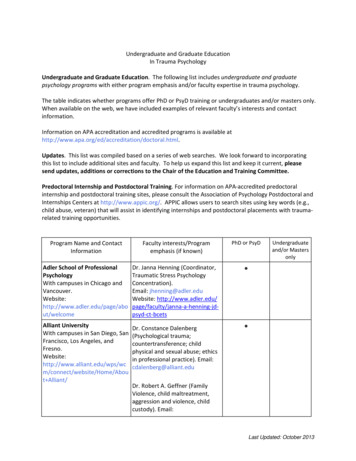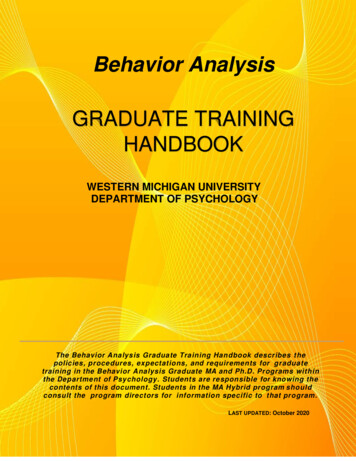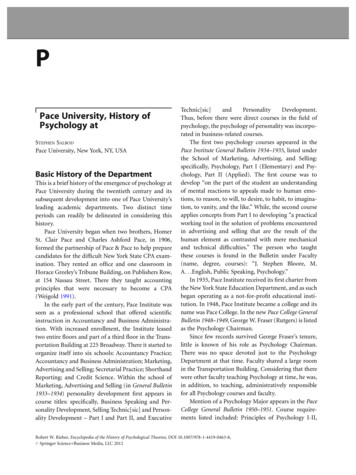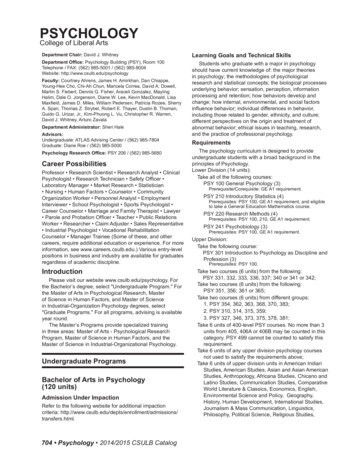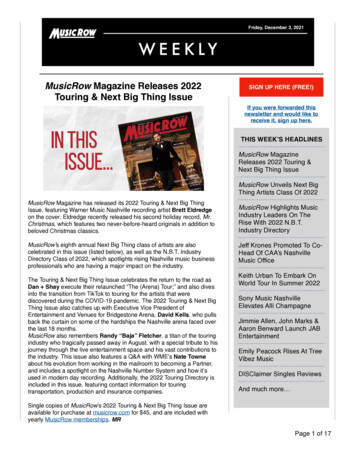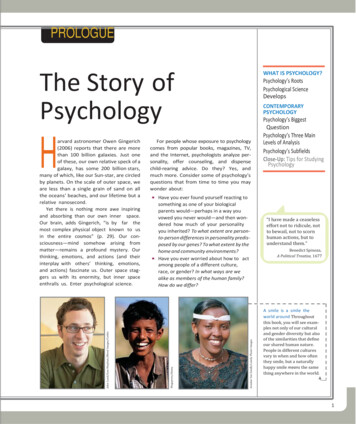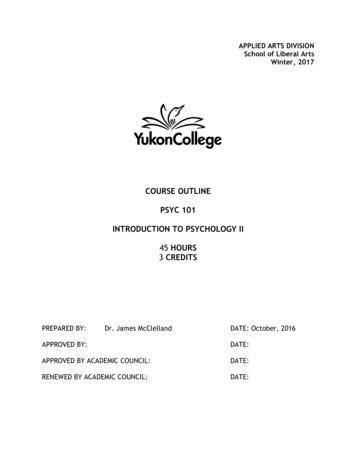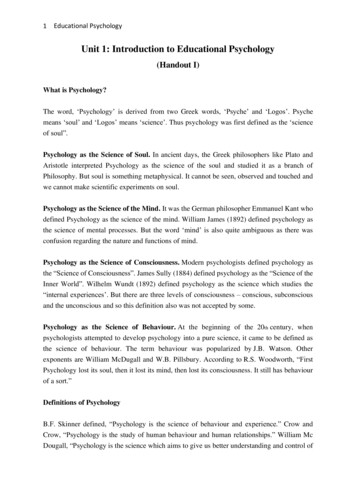
Transcription
GRADUATE STUDENT HANDBOOK2021 - 2022Department of PsychologyLehigh nt/welcome-graduate-program-psychologyVersion: 11/30/2021
Psychology Graduate Student Handbook2Table of ContentsGraduate Study in Psychology . 3Major Portfolio Items . 3I. The Ph.D. Program . 5Coursework Requirements . 5Research Requirements . 71. First Year Research Apprenticeship . 72. Master’s Thesis . 73. General Exam . 94. (Third-Year) Independent Scholarly Activity . 115. Doctoral Dissertation . 11II. The Master’s Program . 11Coursework Requirements . 16III. Students with Prior Graduate Training . 17Pre-dissertation Project . 17IV. Evaluation and Waivers . 18Evaluation . 18Continuation to Doctorate . 18Waivers and Procedure. 18V. Additional Information and Advice . 19Graduate Committee . 19Communication with Advisors and Committee . 19Cases of Conflict . 19Colloquia and Research Brown Bag . 19Research Funding . 20External Funding . 20Internal Funding. 21Certificate in Cognitive Science . 22Conference Travel Support . 22Teaching Opportunities . 22Outside Employment . 23Career Trajectories . 23VI. Contact Information . 24Note. Program requirements described in this document are to be viewed in conjunction with the Universityrules stipulated by the Graduate and Research Committee [see College of Arts and Sciences GraduateStudent Handbook tudent-handbook) and UniversityCourse Catalog .asp)].
Psychology Graduate Student Handbook3Graduate Study in PsychologyWelcome to the Graduate Program in Psychology at Lehigh!As a graduate student, your primary goals are to develop into an expert scholar with broad anddeep understanding of the literature in your area (and related areas), a skilled researcher who iscapable of independently conducting studies that make a contribution to your field and/or solveapplied problems, a capable teacher who can teach a variety of courses, and a skilledcommunicator who can inform and persuade diverse audiences. We are committed to providing asupportive, enriching environment that will facilitate your achievement of these goals. But,obviously, achievement of these goals depends a great deal on you.Recent graduates have identified the following key competencies that they acquired in ourprogram that have helped them succeed in academic and non-academic settings: Well-rounded background knowledge in cognitive, social, and developmental psychology andexpert knowledge in a specific subfield Ability to conduct literature reviews and research studies independently and efficiently Methodological/statistical expertise Writing and science communication skills Positive Work Habits Crucial for Being Effective on a Research Teamo Project/time management skillso Ability to take constructive criticismo Critical thinking skillsThe graduate school years are a time to develop a portfolio whose contents will be an indicator ofhow vigorously and successfully you have pursued the goals and achieved the competencies listedabove. The contents of your portfolio will play a major role in determining your professionalsuccess, and your success on the job market, whether you are looking for a tenure-track researchposition, a teaching focused position, a post-doc opportunity, or work in business, government, orother applied settings1. Here is a non-exhaustive list of the sorts of items that you should keep inmind as you develop your portfolio:Major Portfolio Items Peer-reviewed articles and book chapters. Most of these will be co-authored with a facultymember. To produce a body of work that will enable multiple publications, you will need to bean integral part of at least one faculty member’s lab, involved with multiple data collectionprojects each year. Working with more than one faculty member (and/or with other graduatestudents) is likely to increase your publication rate. Also, when applying for jobs, it will be veryhelpful if multiple faculty members can provide an informed perspective on your research.Please keep in mind that it is the research done in your first three years of graduate schoolthat is likely to be published or in press by the time you hit the job market.Building a network and becoming known to external colleagues. A network of colleagueswho know and respect your work is very important for your success. A primary way thatscholars achieve such recognition, besides publishing, is via conference presentations. At aminimum, you should present at one conference per year. Ultimately, it is desirable to presentat several. You should present at “large” conferences (e.g., APS, Cognitive Science Society,SPSP, Psychonomics, SRCD) and also smaller conferences (e.g., EPA, SPSSI). Beyondconferences, you should also consider opportunities for summer training programs, intensiveseminar series, and so on. To stay informed about all these things, you should join therelevant professional societies in your discipline (ask your advisor) and read their newslettersand email communications.1 See section on Career Trajectories on p. 24
Psychology Graduate Student Handbook4 Broad knowledge of your area and related areas. The way to achieve this is to read. A lot.Your advisor will provide you with readings, as will your General Exam list. But, becomingwidely read is your responsibility. Your reading habits should include following your owninterests and inspirations, while also staying abreast of new theory and findings in your field(e.g., peruse the latest editions of the most relevant journals). Your advisor will be delightedto see you bring ideas into the lab from sources that you are reading on your own. As youadvance, your advisor will expect you to start making independent contributions of this sort. Teach a couple of different classes and attain excellent teaching evaluations. After youcomplete your MS degree, you will have multiple opportunities to teach. You should availyourself of these opportunities and work hard to earn excellent student evaluations. If yougain experience teaching classes that many others do not like to teach (e.g., statistics), thiscan help you on the job market. Note that even if your career goal is to work at a teachingoriented institution, teaching experience does not remove the importance of having a recordas a researcher (i.e., publications, conference presentations). Likewise, research-focusedfaculty still have to be excellent teachers! Development of special expertise that it is not directly tied to your primary research.This might include advanced statistical training (e.g., classes in SEM or HLM), training inspecialized research techniques (e.g., physiological measures, computational modeling, diarystudies), or exploration of literatures outside of psychology (e.g., philosophy, political science,biology). Do not just wait for someone to tell you which of these to pursue. Be proactive andthink about what type of scholar and researcher you want to be. Pursuit of research-related funding. In consultation with your advisor, it is expected thatyou seek funding from various specialized programs that target graduate students, and thatyou get involved in grant proposals to major federal agencies (e.g., NSF, NIMH, NICHD) orfoundations (e.g., Templeton, Ford). Information about these opportunities is disseminatedvia the professional societies of your area. The university and department also have fundsavailable for graduate student research. See further information in the section on ResearchFunding on p. 19-21.As a graduate student, you should focus on developing an impressive portfolio. Your advisor andother faculty will be happy to discuss your portfolio and its development at any time. Competitionfor jobs is intense, and an outstanding portfolio is essential for success. The psychology faculty arecommitted to providing an environment of opportunity and guidance that will help you realize yourpotential and build an admirable portfolio.To ensure that you are making appropriate progress—and to enable faculty to provide timelyfeedback on your portfolio—you will submit your CV and a yearly self-evaluation form to theGraduate Director regarding all your portfolio-relevant activities. These documents will be sharedwith the full faculty, and written feedback will be provided shortly after the end of each academicyear. Furthermore, at the end of the third year, you will convene a meeting of the departmentalmembers of your dissertation committee. One part of this meeting will involve you giving apresentation regarding how you have developed your portfolio over your first three years. Based onthis presentation, the faculty will give feedback about what you may want to focus on in the futureto best meet your professional goals.Remember that your portfolio is an ongoing, developing collection of work that willaccumulate over time. It is something that you will actively work on andstrategically develop throughout your years in the program. The sooner you get started, thebetter, but remember that it takes time. Keep your long-term goals in mind and steadilywork toward them!
Psychology Graduate Student Handbook5I. The Ph.D. ProgramThe Department provides basic training in Human Cognition and Development for all graduatestudents, as well as the opportunity to specialize in an area covered by our intersecting Cognitive,Developmental, and Social Areas.Coursework RequirementsNote: Courses should be concentrated in years 1-3Required courses for the Ph.D. are listed below. These include courses for the M.S. degree takenen route to the Ph.D. Specific requirements for the terminal M.S. are provided later (Table 1, p. 15).These are minimum requirements and students are encouraged to take additional quantitativecourses, psychology seminars, and other relevant courses (e.g., in a different department), asinterest and opportunity allow. Students should speak with their advisors about appropriate ways(and times) to go beyond minimum course requirements.In general, students should take 1 or 2 courses per semester. Also, in most cases students shouldregister for 9 credit hours per semester. To reach 9 credit hours, the student should supplementthe courses below with the course number most appropriate for their research activities (e.g.,PSYC 412: First-Year Project; PSYC 490: Thesis Research; PSYC 461: Research Seminar).Core Courses (3 courses): Students must take Cognitive Psychology (PSYC 403), SocialCognition (PSYC 406), and Developmental Psychology (PSYC 402). A grade of B or betteris required. Students earning grades of B- or lower may, at the discretion of the faculty, beallowed to retake the course or perform other remedial work. Students normally take thecore courses in their first two years of graduate training.Statistics/Research Methods (2 courses): A two-semester sequence of statistics/researchmethods (PSYC 421 and PSYC 422). Students complete this sequence in their first year.Students are also encouraged to take additional statistics/research courses.Professional Seminar (1 course): This seminar (PSYC 409) covers professional developmentissues. It is offered for first-year students each fall semester. We sometimes also offer asecond professional seminar addressing issues for more advanced students (PSYC 410).Graduate Seminars (3 courses): In addition to the three core courses, students are requiredto take at least three additional graduate seminars (numbered PSYC 430 and above).Elective Courses (2 courses): Students must take at least two additional courses. These maybe other graduate Psychology seminars; graduate courses from another department suchas education, sociology, or computer science; or 300-level advanced undergraduatepsychology seminars. These elective courses must be approved by the student’s advisor.Beyond meeting the course requirements above, students must be aware of requirements that arelevied by the College of Arts and Sciences (CAS), which must be met in addition to departmentalrequirements (see: tudent-handbook). Forexample, the CAS requires a minimum of 30 credits (with additional stipulations regarding coursenumbers) for the M.S. degree, and 72 post-baccalaureate credits or 48 post-Masters credits for thePh.D. degree. University regulations stipulate that the list of graduate courses must be approvedby the Doctoral Committee prior to the dissertation defense.
6Psychology Graduate Student HandbookNAME:Yr. in the Program:Record of Courses Completed en route to the Doctoral DegreeThe table below is to assist you, your advisor, and the Graduate Coordinator in monitoringyour progress toward completion of required coursework on your path to the Ph.D. degree.You should cut and paste this table into a document that you will periodically be asked toshare with the Graduate Coordinator or with your advisor.COMPLETED COURSESCourse number & name(e.g., Psyc 406: Social Cog)Stats Course IStats Course IIProfessional SeminarCORE course ICORE course IICORE course IIIGrad seminar IGrad seminar IIGrad seminar IIIApproved course IApproved course IISemester &year coursewas takenUPCOMING COURSESCourse # and name forcourses to be takennext semester
Psychology Graduate Student Handbook7Research RequirementsStudents are expected to be deeply engaged in research throughout their time in the program.Formal research requirements are carried out under the direction of a primary advisor.Below is a table indicating the timeline for major program research requirements.2 As noted in theintroduction above, success as a scholar will depend on more than simply meeting these basicrequirements. Detailed descriptions of each item in the table can be found beneath the table.Year in Program12 FallSpringSummer345Research ActivityResearch ApprenticeshipMaster’s ThesisMaster’s ThesisReading for General ExamGeneral ExamIndependent Scholarly ActivityDissertation1. First Year Research ApprenticeshipCulminating in a draft of the Master’s Thesis proposalResearch Apprenticeship. Starting at the beginning of the first year, every student must becomean integral member of at least one faculty lab. This includes attending lab meetings and alsomeeting individually with your faculty advisor on a regular basis (e.g., roughly weekly) to discussreadings assigned by your advisor that will give you a strong background in their research area.You must also become deeply involved in data collection projects in collaboration with youradvisor. Your involvement will likely include being an experimenter, supervising undergraduateexperimenters, arranging appointment times for participants (and/or supervising undergraduates inthis task), developing study materials, contributing ideas to study design, and so on. In this role,you should acquire working knowledge of the key research “tools” in the lab (e.g., E-prime,Qualtrics, coding procedures, etc.). You should play an active role in acquiring expertise both in theresearch literature and in the research approaches used in the lab. Finally, toward the end of thespring semester of Year 1, every student must give a departmental Brown Bag presentationdescribing a study or set of studies with which he or she was involved.In addition to working with a primary advisor, you are strongly encouraged to work in one or moreadditional labs, beginning in the first or second year in the program. You can discuss theappropriate timing of this with your primary advisor.Draft of Master’s Proposal. Capitalizing on the knowledge, skills, and refinement of interests thathave been gained through the Research Apprenticeship, you should submit a draft of a Master’sThesis proposal to your advisor by June 1 of the first year in the program.2. Master’s ThesisThe Master's Thesis is a major requirement for the M.S. degree which most students acquire enroute to the Ph.D. It comprises an empirical study (or a set of studies) that provides evidence ofproficiency in the student's content area and in research design and methodology.Things to Keep in Minda) Students are responsible for knowing and following CAS guidelines. Here is an extremelyhelpful document: guidelines. Also, feel free2 This table pertains to students who enter without an MS degree (or whose MS degree is not accepted asequivalent to our own). Students whose MS degree is accepted as equivalent to our own can find theirrequirements in “Section III. Students with prior graduate training.”
Psychology Graduate Student Handbook8to consult as necessary with MaryAnn Haller, CAS Manager of Graduate Programs.a) As noted above, an initial draft of the thesis proposal should be shared with one’s advisor byJune 1 of Year 1.b) A Masters committee (see below) should be formed at or before the time the initial draft isgiven to your advisor. The committee will usually receive the proposal after it is revised inconsultation with your advisor.c) The Thesis should be completed by end of Year 2.d) You must take at least 3 credit hours of Thesis Research (PSYC 490); you should NOTregister for more than 6 hours total.The Master’s Thesis Proposal Each student must convene a committee of at least three members to supervise the thesis.The committee chair and at least half of the committee must be psychology faculty. Once theproposal is approved, committee membership can only be changed by agreement of allparties. Cases of disagreement must be referred to the Graduate Committee. Typically, the student distributes a draft of the proposal to the members of the committee andschedules a proposal meeting when the advisor agrees that an acceptable document hasbeen produced, though ultimately this is the student’s judgment (see section on‘Communication with Advisors & Committees’ below). The written proposal should bedistributed to the members of the committee at least two weeks before the proposal meeting. At the proposal meeting, the student is typically asked to summarize the rationale and planfor the proposed research. The committee comments on the thesis plan and may makesuggestions for possible revisions of the plan. Before initiating the proposed work (other than piloting), the proposal must be approved by amajority of the committee.o If the proposal is approved substantially as is, data collection may proceed.o If relatively minor changes are suggested but the general outline of the proposal isdeemed satisfactory, the student in consultation with the advisor incorporatesappropriate changes into the proposal. The student distributes the revised proposal tothe committee. When written approval of the proposal is obtained from the committee,data collection may proceed.o If major changes are considered necessary, a second proposal meeting will be heldfollowing revision of the proposal in line with committee recommendations. Whenwritten approval of the proposal is obtained from the committee, data collection mayproceed. A copy of the proposal with committee approval attached should be filed in the Department. Institutional Review Board (IRB) approval must be obtained by the student for thesis research.Completing a Master’s Thesis A Master’s Degree Program Form and an Application for Degree should be filled out at leastthree months prior to the expected date of graduation. Forms are available s.html. (Deadlines are 3/1 for May graduation, 7/1for September graduation, and 11/1 for January graduation). These forms must be returnedto the registrar’s office (instructions are on the forms). When completing the Master’s DegreeProgram Form list only coursework that is necessary for that degree (additional coursesbeyond those required for the M.S. should be reserved to count toward the Ph.D. degree). Following collection and analysis of the data, the student prepares a draft of the thesis writtenin journal article format following APA style. Typically, a draft of the dissertation is circulated to members of their committee for theirwritten comments or suggestions when the advisor agrees that an acceptable document hasbeen produced, though ultimately this is the student’s judgment (see section on‘Communication with Advisors & Committees’ below).
Psychology Graduate Student Handbook 9A committee meeting should be scheduled when the draft is distributed to committeemembers. The committee should be given at least two weeks to read the draft.During the committee meeting, with all committee members present, the student presentshis/her project for about 10 minutes and then the committee discusses the thesis, asksquestions of the student, and provides suggestions for revisions.The student then revises the manuscript based on committee member feedback andprepares the next draft of the thesis. (Additional rounds of revision may be required before afinal version is approved.) The advisor takes the responsibility to make sure that thesuggestions of the various committee members are met, but all committee members shouldreview the final copy before final approval of the thesis.Once the committee has approved the final draft, the manuscript is formatted andelectronically submitted following CAS graduate degree guidelines. An online submission feeshould be paid to the Bursar’s Office at this time. Guidelines for formatting and electronicsubmission can be found at: guidelines.At this stage, an oral presentation based on the thesis is scheduled in the department.o The oral presentation may be waived for terminal MS students and may be postponeduntil the following semester for continuing PhD students if there is insufficient timebetween completion of the thesis and conferral of the degree.Final paperwork should be submitted to the Registrar’s Office about 3 weeks prior to conferralof the degree. The precise dates for each semester are given in the University Calendar (canbe found at: http://www.lehigh.edu/ inrgs/). Final paperwork includes: title page of the thesis,Abstract of the Thesis, original signature sheet with signatures in blue ink, and onlinesubmission fee receipt. Allow at least 24 hours between electronic submission of the thesisand submission of paperwork to the registrar.A bound copy of the entire Thesis, including a copy of the signed signature page is submittedto the Department.3. General ExamThe General Examination occurs at the end of the summer following Year 2. The aims of theGeneral Exam are to ensure that every student has broad knowledge in his or her area (Cognitive,Developmental, Social), the ability to synthesize ideas and research approaches, and the ability tocommunicate ideas clearly. The General Exam must reflect independent work of the student.Students will obtain the General Exam Reading List for their area (i.e., cognitive, developmental orsocial psychology) at the time they enter the graduate program. The General Exam Committee ineach area will review and update their list on a yearly basis. Although the lists will be quite similarfrom year to year, some changes will occur.The General Exam Committee for each student comprises all faculty from the student’s area. TheCommittee in each area will write a set of exam questions (different every year) from whichstudents will choose a subset to answer. All questions will require critical analysis and synthesis ofthe readings. At least one of the questions will prompt students to suggest empirical studies thatwould make a contribution to knowledge in the area targeted by the question.The Exam Process Students will have 10 days to complete the Exam. General exam questions will be distributedon the Wednesday 2.5 weeks prior to start of Fall classes, and answers will be due 10 dayslater on Friday. Students will receive 4 questions.o Three questions will test the breadth of knowledge students have acquired through thereading list and their graduate education. Answers will require synthesis and integrationacross readings. Students must answer two of the three questions.o One question will test the depth of knowledge in a domain that aligns with the student’sresearch focus. This question will require independent and creative thinking and will
Psychology Graduate Student Handbook 10prompt students to suggest novel empirical studies that target open questions or resolvecontroversies.o Each response is limited to 12-15 pages (double-spaced, 1-inch margins).Exams will be assessed by the student’s General Exam Committee, who will convene ameeting to discuss the student’s performance. The task of the General Exam Committee is todetermine whether the student displays learning, thinking, and writing skills sufficient to meritcontinuation to the Ph.D. – see ‘Evaluation Criteria’ below.To pass the General Exam, the student must be deemed to have performed satisfactorily onall three questions they submit. If performance on one or more questions is not satisfactory,the faculty will determine the student’s options consistent with University guidelines. In thiscase, if overall performance on the Exam is acceptable, the student may be offered theopportunity to rewrite a response or answer a new question. If overall performance is weak,the faculty may determine that the student will not advance to doctoral candidacy.Continuation decisions will also take into account other aspects of the student’s performancein the program – see Continuation section (p. 17) below.If extenuating circumstances arise after the student has received the exam, that is, during the10-day exam period, the student needs to inform the Graduate Director immediately andpresent documentation. If the situation qualifies as an extenuating circumstance, the examwill be terminated and can be taken at a later time within a six-month time period.The exam process cannot exceed six months.Within two weeks of the student turning in the exam, a Report on the General DoctoralExamination must be completed and filed with the department by the student’s committee.The student’s primary advisor will report the majority decision of the committee to the studentand to department faculty.Students are encouraged to seek feedback on their performance from all committeemembers.Evaluation C
Nov 30, 2021 · gain experience teaching classes that many others do not like to teach (e.g., statistics), this can help you on the job market. Note that even if your career goal is to work at a teaching-oriented institution, teaching experience does not remove the importance of having a record as a r

